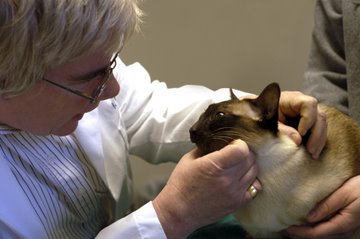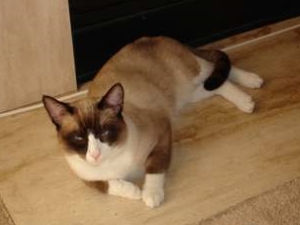Older Cat Care: Looking After Senior Cats
Our older cat care tips to help keep your senior cats in the very best of health. Siamese cats can be long-lived, some surviving well into their twenties, so it's as well to be prepared to care for them as they age.
But first let's find out - what is an older cat?
Cat Life Stages
All cats age differently. A cat's life can be broken down into four main phases:
- Kitten: Birth to puberty (6-8 months)
- Early adult: Puberty to 6 years
- Middle age: 7 to 11 years
- Senior: 12 years onwards
Older Cat Care - Health
Cats' immune systems become less effective in their older years. This makes them more susceptible to infectious diseases.
Take especial care to keep your older cat's vaccinations up to date, particularly if you have one that's allowed outdoors where it might come into contact with others.
Heart, lung, kidney and liver function all slow down, and hearing and sight deteriorate. Regular health care check-ups by your veterinarian help to spotlight potential problems.
What to Watch For
- Changes in behavior
- Weight loss or weight gain
- Drinking more (or less) water than usual
- Difficulty walking
- Bumping into furniture
Older cats' teeth and gums may show signs of wear and tear, too.
Check regularly for signs of gum disease (redness, bleeding, broken teeth, plaque deposits) and get advice from your veterinarian on how to care for and treat any dental problems.
Teeth should be professionally cleaned and if you can (and your cat will let you) learn to brush their teeth yourself - ideally, daily.
 Essential older cat care: check your cat's teeth regularly
Essential older cat care: check your cat's teeth regularlyImage © iStockphoto | Nancy Louie
Older Cat Care - Diet and Weight
An older cat's digestive system slows down, too, so you may need to make some changes to their diet.
There are foods specially formulated for mature cats, some of which are tailored to individual health conditions - diabetes, kidney and heart disease, dental problems.
Taking care of an older cat includes watching their weight. Too much weight puts a strain on all the body systems, so keeping them slim helps to extend their years and improve their quality of life.
Once cats become less active, they need less food to prevent them becoming overweight. Foods made for older cats have less protein and fat, and more fiber, which helps cats feel full on fewer calories.
Some older cats may actually get thinner, not fatter, as their digestive systems become less efficient at using the nutrients in their food.
Weight loss might also indicate more serious problems, for example thyroid or kidney disease, and should always be checked out by a vet.
Low appetites may need to be tempted a little. Experiment with different foods and try adding a little chicken stock or baby food to usual foods to help stimulate the desire to eat.
Older Cat Care - Reduced Activity
Can your cat still climb and jump?
If his bed or favorite perch is too high, he may no longer be able to reach it. Have a chair or stool nearby to allow easier access to the places he likes to rest, or place beds and perches nearer the floor.
Decreased activity will make cats feel colder, too. Make sure your cat's bed is warm. Put a hot water bottle or heating pad under their bedding to keep them snug.
The End of a Long Life
Doreen Tovey, in 'The New Boy', one of her wonderful books about Siamese cats, said:
"the one disservice animals render us is that
they don't live as long as we do"
The most compassionate thing you can do for your cat is to ensure that the end of his life is comfortable and pain-free.
No-one enjoys seeing their feline companions struggle on, but taking the decision to end their life can be heart-breaking, and it can be difficult to judge when the 'right time' is.
Your veterinarian can advise you about euthanasia once your cat's life becomes too difficult to live enjoyably, but most people say they 'just know' when it's time to say goodbye.
Related Pages
Some of the articles and newsletters on this site may contain links to products I think you may enjoy. If
you purchase through these links I receive a small commission, but there's
no extra cost to you. Find out more on the Affiliates Disclosure page.
Have You Discovered Our Newsletter?
If not, why not? Subscribe to our email newsletter, Meezer Musings, to stay in touch, be the first to see new information and pages as they come out, and read the things we only talk about in the newsletter.
Learn more about it on our Newsletter Sign-Up page.




